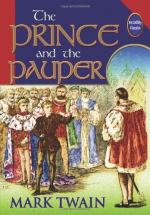At noon he was still tramping—among the rabble which followed after the royal procession, now; for he argued that this regal display would attract his little lunatic powerfully. He followed the pageant through all its devious windings about London, and all the way to Westminster and the Abbey. He drifted here and there amongst the multitudes that were massed in the vicinity for a weary long time, baffled and perplexed, and finally wandered off, thinking, and trying to contrive some way to better his plan of campaign. By-and-by, when he came to himself out of his musings, he discovered that the town was far behind him and that the day was growing old. He was near the river, and in the country; it was a region of fine rural seats—not the sort of district to welcome clothes like his.
It was not at all cold; so he stretched himself on the ground in the lee of a hedge to rest and think. Drowsiness presently began to settle upon his senses; the faint and far-off boom of cannon was wafted to his ear, and he said to himself, “The new King is crowned,” and straightway fell asleep. He had not slept or rested, before, for more than thirty hours. He did not wake again until near the middle of the next morning.
He got up, lame, stiff, and half famished, washed himself in the river, stayed his stomach with a pint or two of water, and trudged off toward Westminster, grumbling at himself for having wasted so much time. Hunger helped him to a new plan, now; he would try to get speech with old Sir Humphrey Marlow and borrow a few marks, and—but that was enough of a plan for the present; it would be time enough to enlarge it when this first stage should be accomplished.
Toward eleven o’clock he approached the palace; and although a host of showy people were about him, moving in the same direction, he was not inconspicuous—his costume took care of that. He watched these people’s faces narrowly, hoping to find a charitable one whose possessor might be willing to carry his name to the old lieutenant—as to trying to get into the palace himself, that was simply out of the question.
Presently our whipping-boy passed him, then wheeled about and scanned his figure well, saying to himself, “An’ that is not the very vagabond his Majesty is in such a worry about, then am I an ass—though belike I was that before. He answereth the description to a rag—that God should make two such would be to cheapen miracles by wasteful repetition. I would I could contrive an excuse to speak with him.”
Miles Hendon saved him the trouble; for he turned about, then, as a man generally will when somebody mesmerises him by gazing hard at him from behind; and observing a strong interest in the boy’s eyes, he stepped toward him and said—
“You have just come out from the palace; do you belong there?”
“Yes, your worship.”
“Know you Sir Humphrey Marlow?”
The boy started, and said to himself, “Lord! mine old departed father!” Then he answered aloud, “Right well, your worship.”




